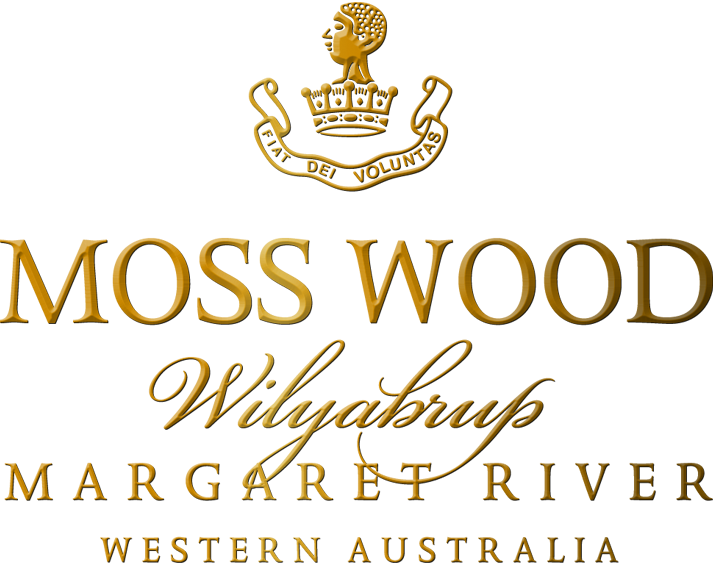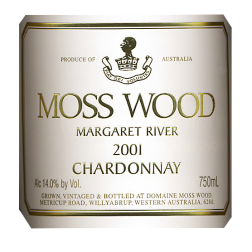Moss Wood 2001 Chardonnay
Wine Facts
| Harvested: | 14/2/2001 |
| Bottled: | 7/2/2002 |
| Released: | 11/4/2002 |
| Yield: | 7.51 t/ha |
| Baume: | 13.40 |
| Alcohol: | 14.00% |
| Vintage Rating: | 10/10 |
SOLD OUT
Moss Wood 2023 Chardonnay – Fergal Gleeson, Great Wine Blog
The nose tells you that you are in for something complex and delicious. A lightning rod of refreshing acid runs through this wine robed in lime, grapefruit and textured tannins. The Moss Wood house style is traditionally a rich and full bodied Wilyabrup Chardonnay. Perhaps it’s the cooler vintage…
Moss Wood 2023 Chardonnay – Ray Jordan, Ray Jordan Wine
One of the best chardies yet from Moss Wood, and that’s saying something with the quality of wines over the years. The nose is an immediately captivating combo of lemon curd, quince and cashew with just a subtle lift of zest. The palate has a sprightly energy with a crisp…
Moss Wood 2022 Chardonnay – Cassandra Charlick, Decanter
Creamy nougat, with a simmering, flinty minerality and lemon curd on the nose. There’s gentle yet opulent oak spice, a little char and pretty white florals lifting things up to craft an elegant and refined picture. In its youth the oak is still persistent, but time should nestle this further…
Moss Wood 2022 Chardonnay – Jane Faulkner – James Halliday, The Wine Companion
It falls into the big, rich and ripe camp. Bold flavours of dried pears and apricots with some apple compote dusted in warm spices and butter. Lashings of oak, cedary sweet and spicy, which is bolstering the palate even more. It’s a solid wine, and no doubt it has a…
Moss Wood 2021 Chardonnay – Jane Faulkner – James Halliday, The Wine Companion
Fans of bold, rich and ripe chardonnay will relish this wine. Off a cooler vintage, so thankfully there’s plenty of acidity here to offset those full flavours of ripe white peach, mango, and preserved lemon rind with loads of oak adding baking spices and woodsy characters. A hint of butterscotch,…
Moss Wood 2022 Chardonnay – Erin Larkin, The Wine Advocate
The 2022 Chardonnay leads with a nose redolent of white chocolate praline, roasted/salted/crushed cashews, orange oil, vanilla pod and wafer. In the mouth, the phenolics serve to almost balance the opulent fruit; this is a huge, pillowy wine of substance and volume. It tastes the way custard cooking on the…
Moss Wood Ribbon Vale 2023 Chardonnay – Ray Jordan, Ray Jordan Wine
A recent addition to the Moss Wood portfolio showing the great strides that have been taken in managing the Ribbon Vale vineyard. This is probably the best release yet. It was a superb season and its shows in a wine of elegance and refinement, yet with layered complexity and sophistication….
WA Wine Review 2024
Ray Jordan “Moss Wood is a family-owned wine company and a pioneer of the Margaret River region. Planted in 1969, Moss Wood is an important founding estate of Margaret River. Clare and Keith Mugford, as viticulturalists, winemakers and proprietors, have been tending the vineyard and making wine at Moss Wood…
Moss Wood 2022 Chardonnay – Ray Jordan, Ray Jordan Wine
Another cracking good chardonnay from Moss Wood. The aroma is immediately engaging with a floral lemon scent and a slight vanilla bean essence. Subtle cut lime and pear edge into add some further complexity. The palate is a powerful statement with a deeply intense creamy stone fruit and edgy lemon…
Moss Wood 2022 Chardonnay – Fergal Gleeson, Great Wine Blog
The Moss Wood house style is rich and at the complex end of the Margaret River spectrum. Sourced from the historic Wilyabrup estate vineyard, there is no attempt to force a lean or mineral Chardonnay from the site. It’s full bodied but shapely. Lime and nectarine fruit flavours, marmalade and…
Tasting Notes
The colour is deep straw, with green tints. On the nose it is strongly perfumed with a combination of grapefruit, peach, and rockmelon fruit aromas and rich notes like orange marmalade (Rose's traditional, of course!). Complexity is provided by caramel from malolactic fermentation, lees and roasted nuts and cedary oak.
The flavours are generous ripe melon and peach, with an attractive mouthfeel, good length and texture. The acidity is lively but not dominant and tannin completes a firm but balanced structure. On the finish the wine shows spicy, toasty oak that lingers.
Vintage Notes
As far as the weather was concerned, the 2001 vintage at Moss Wood could hardly have been better. Yields in the vineyard were average, rainfall was good and came at the right times and diseases were easily controlled. The birds tried to spoil the fun by arriving in the vineyard earlier than we had ever seen them but we got the nets on soon enough to prevent any significant losses.
Although we have paid a great deal of attention to canopy management for many years our plan, leading up to the 2001 vintage, was to maximise the exposure of fruit on the vines. This would lead to an improvement in the aroma and flavour ripeness of the chardonnay grapes but at lower sugar levels than we had been able to achieve beforehand. Consequently, the finished wine would have lower alcohol levels without losing flavour intensity.
Some warm weather at the end of February ripened the chardonnay a little faster than we had anticipated. However, Matt Bowden's grape sampling was typically accurate (the winery crew are lounging about laughing at the thought of this!) and we were ready to harvest when our grapes hit our required picking ripeness of 13° beaume on the 15th February. This would have brought the finished wines in at a maximum of 14% alcohol.
Instead of all this happening, we picked at 13.4° beaume and the wines finished with a whopping 14.5% alcohol which suggests that we missed our target by about two days. As a result, we have completely reviewed our sampling technique for the 2002 vintage. Customers will have to wait till next year to know the result!
The purpose of the detail here is to highlight the fact that we do not live in a perfect world and that we are determined to get things right but sometimes just miss the mark. From a wine point of view, it has made only a small difference but we believe that we should work at improving our wine styles wherever we can.
Production Notes
As usual, the processing was divided into two parts. The 'clonal chardonnay' was picked separately and whole bunch pressed; the juice was then put straight into barrel for fermentation, allowing for innoculation by wild yeast culture. This slightly aggressive technique is used because these clones, selected from the University of California at Davis, are very high yielding and tend to lack good fruit flavour. In fact, around Margaret River they are disparagingly referred to as the 'trebbiano clones' because of their uncanny resemblance to this high yielding, neutral grape variety. To gain more complexity, the Moss Wood crew retain more solids than usual in the juice and carry out the entire fermentation in wood.
The main batch, made using the Mendosa clone, is much more flavoursome and is treated more carefully to retain and enhance its good fruit depth. In this instance, the bunches were de-stemmed, the grapes pumped through the must chiller (which is cooled to 8°C) and then added to the press. Two lots of juice result: the free-run (the juice which drains off before pressing takes place) and the pressings (that which is extracted by the pressing process). These are combined, settled for 48 hours at 12°C and then pumped to a fermentation tank.
At this point, the juice is allowed to warm up and fermentation commences. For the 2000 Chardonnay, wild yeasts were allowed to start the process and a pure yeast strain was added during fermentation to finish it off. Debate continues about the benefits this sequential innoculation technique brings. While there is no doubt in our minds that the indigenous yeasts do add complexity to the wine, the risk associated with using a culture whose characteristics are not known in advance, is a worry for him. He believes that the loss of control over the process that this brings adds a commercial risk that is hard to justify, given the relatively small quality gains.
Once fermentation was underway, batonnage (lees stirring) was done once per day, both in tank and barrel. In the stainless steel tank the wine was held at 18°C and then moved to casks where it was kept at ambient temperature. From the 2001 vintage, there will be even greater control because all the barrel cellars are now airconditioned.
After the primary fermentation finished, the lees stirring continued once a week until the malolactic fermentation was completed. Then the wine was left undisturbed on its lees in new 225 litre French oak barriques for a total of ten months. It was bottled at the beginning of February 2002.
Cellaring Notes
This is a fine, elegant Chardonnay with impressive power and over the next two to three years can be enjoyed for its fruit generosity but will also repay long term cellaring. A recent tasting of the 1991 Moss Wood Chardonnay confirmed the ability of the wine to become even more complex and enjoyable after extended maturation. Optimum drinking 2013.

